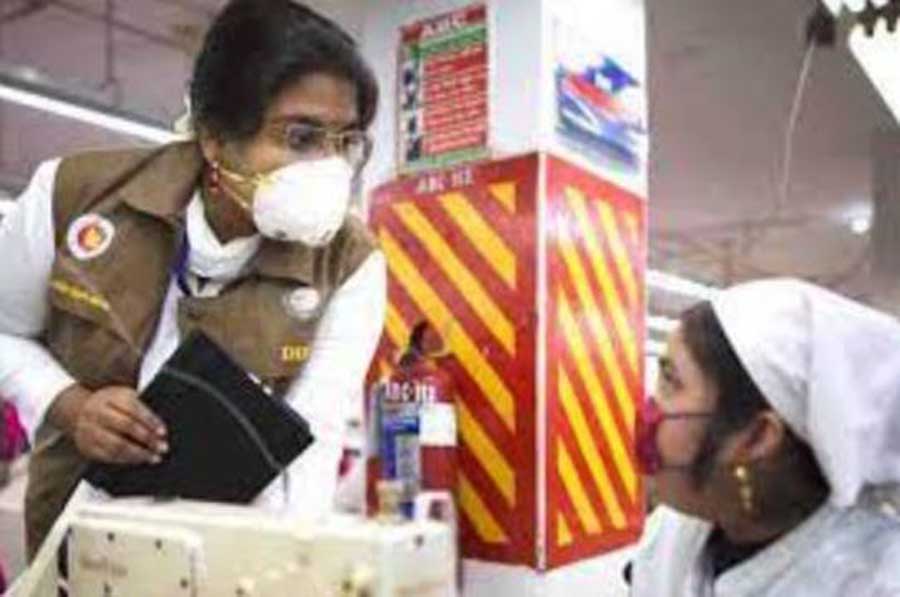
Published :
Updated :

Government high officials are expected to sit today with the stakeholders for reviewing latest progress in executing the National Action Plan (NAP) on labour rights, on the heels of western concerns.
Sources have said representatives from the foreign, labour and commerce ministries, apex-chamber FBCCI, BGMEA and BKMEA are likely to attend the meeting with senior secretary at the commerce ministry Tapan Kanti Ghosh in the chair at his secretariat office.
Different labour rights-related issues, including latest progress on the NAP, will be discussed at the meeting, they also said.
The NAP covers broadly nine issues, including framing Bangladesh labour law in compliance with the ILO standards on freedom of association and collective bargaining, and eliminating child labour in all its forms by 2025.
Among the other issues are combating violence against workers, harassment, unfair labour practices, increasing the success rate of application for trade-union registration (paper and online) to a minimum of 90 per cent and avoiding discretionary refusal of trade-union registrations, according to a high official at the labour ministry.
In reference to labour and human-rights situations in Bangladesh, the European Union has just called for accelerating the implementation of the National Action Plan on labour sector of the country to secure duty-free market access there, according to European Commission's new report on the Generalised Scheme of Preferences (GSP) covering the period 2020-2022, published on November 21.
It also says the EU will continue to closely monitor the NAP-implementation process.
Regarding key concerns related to labour rights, the report referred to "legal obstacles to the right to establish and operate trade unions, anti-union discrimination, shortcomings related to labour inspection, gaps in implementing occupational health and safety, and persistence of child and forced labour".
Industry owners claim that the country's largest export sector-readymade garments-has been cleansed of child labour. And most factories have been turned eco-friendly.
Over human rights the bloc cited "deficiencies regarding freedom of expression, freedom of assembly and association and civil society space, as well as cases of alleged torture, ill-treatment, extra judicial killings and enforced disappearances".
The country developed The National Action Plan on the Labour Sector of Bangladesh (NAP 2021-2026) and published it in September 2021, following intense and productive technical discussions with the European Union. In 2022, the letter reminded, Bangladesh ratified the ILO Convention 138, committing to the international community that no child below 14 years of age is allowed to work or be employed. "Implementation of the NAP commitments on labour rights should speed up, with regular reports on progress achieved," the report reads, adding that the EU will continue to closely monitor the implementation.
An EU monitoring mission was in Dhaka for a five-day visit last month (on November 12-16) to assess the compliance of Bangladesh with its commitments under the EBA (everything but arms) trade arrangement.
The monitoring mission also stressed the need to fully implement the NAP, in particular with regard to guaranteeing freedom of association, collective bargaining, and an inclusive and representative participation of labour unions through tripartite consultation.
The mission regretted that the recent amendments of the Bangladesh Labour Act only partially addressed the concerns of the EU-ILO duo. Trade union-registration threshold has been reduced to 15 per cent for factories having more than 3000 workers, which was previously 30 per cent.
About the labour issues, the Bangladesh mission in Washington, referring to recently announced US Presidential Memorandum on advancing labour rights, seemingly applicable globally, has raised concerns related to Bangladesh that the country may be one of the "targets" for stringent measures such as sanctions, trade penalties and visa restrictions.
The alert message came in a letter sent to the commerce ministry-incidentally in the wake of recent labour unrest on demand for wage hike and troubleshooting action.
In 2022, the EU imported goods worth 22.7 billion euro from Bangladesh, which was 15.36 billion euro in 2019.
EU's preferential imports from the country increased by 47.5 per cent during the 2019-2022 period, according to the report.
In fiscal year 2022-23, Bangladeshi exports fetched from the EU market, the country's largest export destination, US$ 25.23 billion, accounting for 45.42 per cent of the country's total export earnings.
rezamumu@gmail.com


 For all latest news, follow The Financial Express Google News channel.
For all latest news, follow The Financial Express Google News channel.